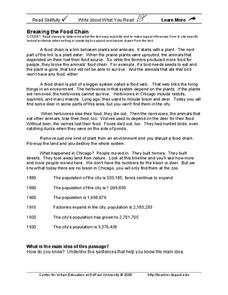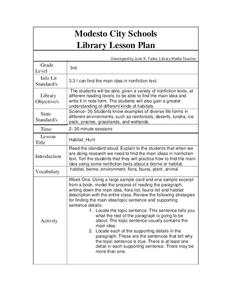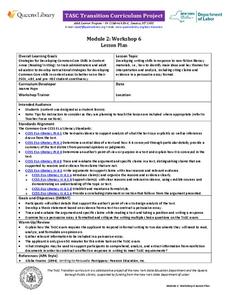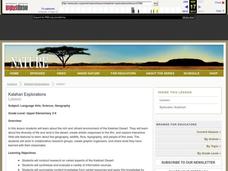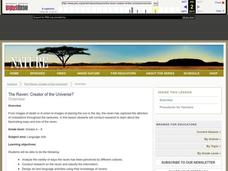DePaul University
The Working Tools of Insects
The animal kingdom is full of interesting organisms that have unique ways of surviving. Children read about different insects that have special tools for building homes and protecting themselves. When finished, learners identify the main...
EngageNY
Mid-Unit Assessment: Close Reading of Bullfrog at Magnolia Circle: Bullfrog Life Cycle
The sixth lesson plan in this Bullfrog at Magnolia Circle unit assesses your third graders' ability to read and understand informational text. The included assessment asks learners to take notes about the main idea and supporting...
EngageNY
Close Reading of Bullfrog at Magnolia Circle: Main Ideas about the Bullfrog
As your class reaches the end of the book Bullfrog at Magnolia Circle, the seventh lesson in this literary unit helps third graders transition from reading narrative to expository writing. Scholars develop their note-taking skills...
DePaul University
Breaking the Food Chain
Throughout history, the growth of big cities has resulted in the destruction of ecosystems. In the case of Chicago, IL, a grassland that was once home to bison, deer, wolves, and foxes quickly became a booming city of over three million...
Curated OER
Hands-On Outlining
In order to write an effective outline, children must be able to identify main ideas and supporting details, which is the aim of this fun and kinesthetic activity. The class works on the floor to organize sentence strips prepared by the...
Curriculum Corner
Guest Teacher Plans: Kindergarten
Emergencies happen. Be prepared the next time you have to call in a substitute with a lesson plan designed to meet the needs of a kindergarten class. Throughout the day, class members work with number and alphabet cards, identify numbers...
Curated OER
Environmental Benefits of Recycling
Fourth graders understand the benefits of recycling. In this recycling literacy instructional activity, 4th graders read an article and identify the main idea. Students understand the process of transfer to the landfill and discuss how...
Curated OER
The Spotted Owl
Second graders explore using nonfiction text to gain information. Working in pairs, 2nd graders read an article about the spotted owl. Each group identifies the main idea and supporting details of their text and use this information to...
Curated OER
Habitat Hunt
Third graders read several nonfiction texts and practice finding the main idea for the text as well as learn about various habitats. In this main idea lesson plan, 3rd graders read several nonfiction texts and make habitat cards....
Curated OER
When the Fly Flew In by Lisa Westberg Peters
The students will listen to the story When the Fly Flew In, and be able to identify the main idea of the story and many of the (supporting) details. Students will also develop an appreciation for the humor and illustrations. After...
Curated OER
Rain Forest Research
Second graders explore the Rain Forest. In this research lesson, 2nd graders go online to gather information about Rain Forest animals. Students print and use the information to write about the many parts of the Rain Forest. Students are...
Curated OER
Cloning
In this cloning worksheet, high schoolers will read a paragraph about how cloning has been a benefit to medicine and agriculture. Students will underline the main idea in the paragraph and write down three supporting details. Then high...
EngageNY
TASC Transition Curriculum: Workshop 6
Is a college education necessary for success in today's world? The class investigates the question, along with others at the end of the sixth workshop in a 15-part series. The lesson has four parts with multiple activities and...
Curated OER
Identify Virginia Native Animals
Learners practice using an online encyclopedia to research native animals to Virginia. Using the information from the encyclopedia, they identify the main and supporting ideas. They share their information with the class using the...
Curated OER
In The Zone
Third graders identify ways that ocean animals grow, survive, reproduce, and adapt. They use computer Internet skills to acces and collect information. They create a PowerPoint presentation. They demonstrate writing skills throughthe...
Curated OER
Kalahari Explorations
Students explore world geography by completing graphic organizers and researching the Internet. In this Kalahari desert instructional activity, students identify the geographic location, weather and creation of the Kalahari desert....
Curated OER
“THE LORAX” by Dr. Seuss
Few children's books convey the message of conservation as well as Dr. Seuss' The Lorax. Read the story aloud, emphasizing the interconnectedness of plants and animals in an ecosystem and discussing different ways people can help...
Channel Islands Film
Santa Cruz Island - Visible Thinking Routines
Visible Thinking Routines are designed to help learners deepen their understanding of what they are learning and enable them to communicate their understanding of concepts to others. Individuals adopt one of these routines to use to...
Curated OER
Class Field Guide to the Sloughs
Students explore how to use field guides to identify wildlife. In this nature lesson students construct their own plant field guide.
Curated OER
The Raven: Creator of the Universe?
Young scholars explore biology by researching birds in class. In this raven identification instructional activity, students utilize the Internet to identify the anatomy, habits and habitat of ravens. Young scholars write descriptive...
Curated OER
Moon WebQuest
Third graders research basic information about the moon and identify the phases and order of the phases of the moon. They conduct Internet research, complete a moon WebQuest, and write a magazine article about the moon using their...
Alabama Learning Exchange
Who Sank the Boat?
Fifth graders experiment with student-made aluminum boats to test for buoyancy. They design a boat and determine how many marbles it takes to sink it while recording their data in a spreadsheet. They design a graph using the data and...
Alabama Learning Exchange
Ready, Set,...Research!
Third graders complete a research project on a weather topic using a variety of resource materials. They demonstrate the use of dictionaries and encyclopedias. They write a report using the research material and grade level appropriate...
Alabama Learning Exchange
Echolocation Stations: Exploring Sound
Fourth graders explore the concept of echolocation during a unit on whales. They listen to the book and watch the Reading Rainbow video for "Humphrey: The Wayward Whale," explore various websites, and conduct experiments to demonstrate...



